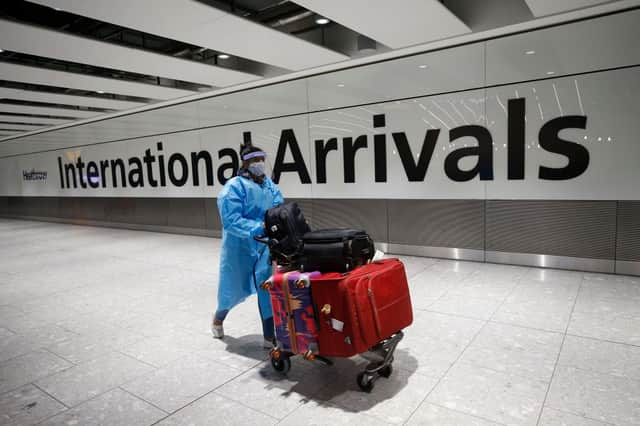UK arrivals face fines up to £10k for breaking quarantine - and must pay £1,750 for hotel stay


People arriving in England from Covid-19 hotspots abroad face fines of up to £10,000 and a 10 year jail sentence if they break the new travel rules, the Health Secretary has announced.
Matt Hancock has said that people who are required to quarantine in hotels after returning from “red list” countries will have to pay £1,750 to cover the cost of their accommodation, transport and testing.
Stricter travel rules
Advertisement
Hide AdAdvertisement
Hide AdAs of 15 February, UK nationals and residents returning from a list of 33 countries where the government fears Covid-19 variants have spread will have to self-isolate in approved accommodation for a 10 day period.
Mr Hancock explained that travellers will be issued a fine of up to £10,000 if they fail to quarantine for the required period.
Passengers required to stay in a government-approved quarantine hotel will need to reserve a room online in advance, with the booking system due to open on Thursday (11 February).
The £1,750 fee for an individual includes the hotel, transfer and testing.
Advertisement
Hide AdAdvertisement
Hide AdThese travellers will only be allowed to enter the UK through a “small number of ports that currently account for the vast majority of passenger arrivals”.
The Cabinet minister told the Commons that 16 hotels have now been contracted for the programme which is due to begin on Monday (15 February).
Additionally, anyone who attempts to conceal that they have been in one of the countries named on the “red list” in the 10 days before arrival in the UK by lying on their passenger locator form will face up to 10 years in jail.
Mr Hancock also confirmed the new “enhanced testing” regime for all international travellers, which will mean people must get a Covid-19 test two and eight days into their 10 day quarantine period from 15 February.
Advertisement
Hide AdAdvertisement
Hide AdThe Department of Health and Social Care (DHSC) said the move was designed to provide a “further level of protection” enabling the authorities to track new cases more effectively.
Speaking in the Commons, Mr Hancock said: “People who flout these rules are putting us all at risk.
“Passenger carriers will have a duty in law to make sure that passengers have signed up for these new arrangements before they travel, and will be fined if they don’t, and we will be putting in place tough fines for people who don’t comply.
“This includes a £1,000 penalty for any international arrival who fails to take a mandatory test, a £2,000 penalty for any international arrival who fails to take the second mandatory test, as well as automatically extending their quarantine period to 14 days, and a £5,000 fixed penalty notice – rising to £10,000 – for arrivals who fail to quarantine in a designated hotel.”
Which countries are on the “red list”?
Advertisement
Hide AdAdvertisement
Hide AdThe four UK nations have agreed that people arriving from high-risk countries on a “red list” will have to quarantine in hotels, but Scotland plans to introduce a more “comprehensive” approach to “managed quarantine”.
The Scottish government intends to introduce a managed quarantine requirement for anyone who arrives directly into Scotland, regardless of where they have come from.
Scottish Transport Secretary Michael Matheson said that anyone arriving from overseas “directly into Scotland” will have to go into “managed isolation”, meaning hotel quarantine, from Monday (15 February).
He said that UK plans to only use hotel quarantine for countries on the “red list” are “not sufficient” and said a more comprehensive approach would be needed to restrict international travel to stop new variants from entering the country.
Advertisement
Hide AdAdvertisement
Hide AdMr Matheson added that the UK Government continued to rely on a “targeted, reactive approach”, and insisted this was “no longer sufficient” in the face of the threat from coronavirus.
The full list of countries which require travellers to quarantine is as follows:
- Angola
- Argentina
- Bolivia
- Botswana
- Brazil
- Burundi
- Cape Verde
- Chile
- Colombia
- Democratic Republic of the Congo
- Ecuador
- Eswatini
- French Guiana
- Guyana
- Lesotho
- Malawi
- Mauritius
- Mozambique
- Namibia
- Panama
- Paraguay
- Peru
- Portugal (including Madeira and the Azores)
- Rwanda
- Seychelles
- South Africa
- Suriname
- Tanzania
- United Arab Emirates (UAE)
- Uruguay
- Venezuela
- Zambia
- Zimbabwe